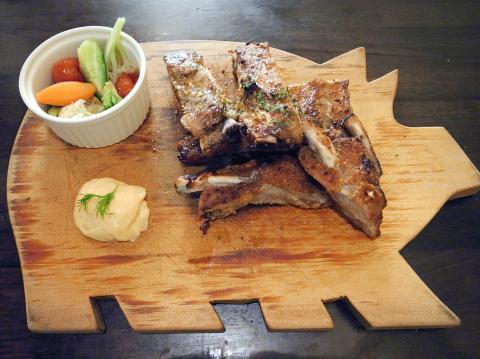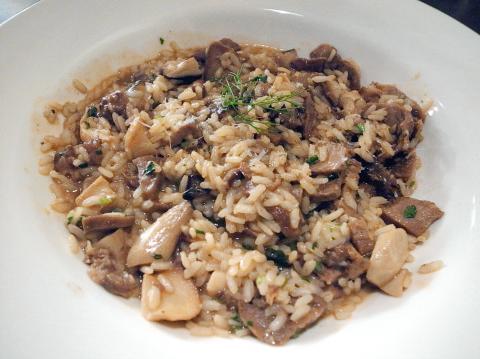Dancing Pig (豬跳舞小餐館), which opened in July last year near Sun Yat-sen Memorial Hall (國父紀念館), is a pork lover’s paradise and the latest endeavor by up-and-coming chef Jason Lin (林志豪), who first emerged on the city’s restaurant scene with Italian establishments Big Pancia (大肚皮義式餐坊) and Va Bene.
As its name suggests, pigs and their meat feature prominently on the menu at this snug restaurant, where diners are charmed by artery-clogging yet soul-satisfying meals served in big portions at wallet-friendly prices.
Stuffed with piggy knickknacks ranging from piggy dolls and piggy figurines to piggy paintings, the interior seems more like a cute cafe designed to appeal to females and youngsters than a carnivore’s palace.

Photo: Ho Yi, Taipei Times
On a recent visit, several children spent most of their time lying on a sofa near the entrance while playing with a couple of plush pig toys. Evidently, chef Lin’s love for the animal makes his restaurant a popular destination for families with kids.
Though beef, mutton and other meats are available, my dining companion and I decided to stick with pork dishes and paid an extra NT$100 to make our orders into set meals with soup and a drink. We began with potato soup, which was over-salted, but that initial disappointment quickly vanished when the pig ear chips with lemon and caper mayonnaise (酥炸豬耳朵附酸豆美乃滋, NT$180) arrived.
Breaded, chopped pig ears deep-fried to crispy perfection: the appetizer approaches culinary genius. The dish was simple, yummy and the sourness of the sauce added a flavorful zest while offsetting the greasiness of the fried ears. Pair the crunchy number with the lemoncello bubble (NT$130), a bubbly drink mixed with Italian lemon liqueur and Sprite. It’s a pity that movie theaters don’t sell deep-fried pig ears.

Photo: Ho Yi, Taipei Times
For our main course, my partner had the restaurant’s signature roasted pork rib in Taiwanese barbecue sauce (惡魔風烤豬肋排, NT$460), which was crispy on the outside and juicy on the inside.
My risotto with stewed pig tongue (鄉村燴豬舌燉飯, NT$320), an award-winning dish by Lin, was equally enjoyable. What is often a tough and gamy cut of meat, was cooked to perfection and the strong flavor was matched by a robust herb and mushroom sauce.
Both of the dishes came in impressively large portions, and halfway through my futile attempt to finish the food, I literally felt blood flowing out of my brain to aid digestion. As a result, I sadly forsook the bread pudding with ice cream vanilla (麵包布丁佐香草冰淇淋, NT$110) that many bloggers have been raving about.
Other recommended dishes include the half chicken with vegetables and starch (哈佛脆皮嫩肉雞, NT$360) and the assorted charcuterie plate (綜合鄉村開胃拼盤, NT$280), which combines Italian tidbits like salami with Taiwanese snacks such as pork jelly and duck gizzards.
The restaurant’s beverage menu includes beers from Italy, France, Belgium and Taiwan (NT$130 to NT$160), as well as a selection of red, white and sparkling wines (NT$700 to NT$1,380 per bottle).

In the March 9 edition of the Taipei Times a piece by Ninon Godefroy ran with the headine “The quiet, gentle rhythm of Taiwan.” It started with the line “Taiwan is a small, humble place. There is no Eiffel Tower, no pyramids — no singular attraction that draws the world’s attention.” I laughed out loud at that. This was out of no disrespect for the author or the piece, which made some interesting analogies and good points about how both Din Tai Fung’s and Taiwan Semiconductor Manufacturing Co’s (TSMC, 台積電) meticulous attention to detail and quality are not quite up to

April 28 to May 4 During the Japanese colonial era, a city’s “first” high school typically served Japanese students, while Taiwanese attended the “second” high school. Only in Taichung was this reversed. That’s because when Taichung First High School opened its doors on May 1, 1915 to serve Taiwanese students who were previously barred from secondary education, it was the only high school in town. Former principal Hideo Azukisawa threatened to quit when the government in 1922 attempted to transfer the “first” designation to a new local high school for Japanese students, leading to this unusual situation. Prior to the Taichung First

Chinese Nationalist Party (KMT) Chairman Eric Chu (朱立倫) hatched a bold plan to charge forward and seize the initiative when he held a protest in front of the Taipei City Prosecutors’ Office. Though risky, because illegal, its success would help tackle at least six problems facing both himself and the KMT. What he did not see coming was Taipei Mayor Chiang Wan-an (將萬安) tripping him up out of the gate. In spite of Chu being the most consequential and successful KMT chairman since the early 2010s — arguably saving the party from financial ruin and restoring its electoral viability —

The Ministry of Education last month proposed a nationwide ban on mobile devices in schools, aiming to curb concerns over student phone addiction. Under the revised regulation, which will take effect in August, teachers and schools will be required to collect mobile devices — including phones, laptops and wearables devices — for safekeeping during school hours, unless they are being used for educational purposes. For Chang Fong-ching (張鳳琴), the ban will have a positive impact. “It’s a good move,” says the professor in the department of